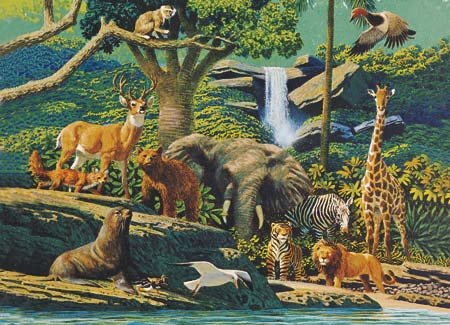Last week I asked the question of if there was death before Adam.
I got many great and varied responses.
Some where dismissive of the whole Eden story, seeing it simply as a fairy-tale or fiction.
Others saw much of metaphor in the Eden account while for others it was a real head scratcher.
Still others hold dogmatically to the idea that Adam was the first to introduce death into the world and that anything (meaning the eaten fruit) that transpired before that was magically or miraculously taken care of.
So here are a couple of my thoughts, but before that a little look at what the biological purpose of death is.
If a population is able to reproduce then their numbers increase. If numbers continue to increase unabated then soon a population will run out of the resources required to sustain life. Death is the necessary mechanism to maintain a balance of resources.
Death is an absolute biological necessity.
Lets take for instance the simple example of how many rats you get from one pair in one year. If you start with a pair, then each female reproduces 10 babies every 2 months
Let's assume 50% of the babies are female.
- After 2 months- 6 males, 6 females.
- After 4 months- 36 males, 36 females.
- After 6 months- 216 males, 216 females.
- After 8 months- 1296 males, 1296 females.
- After 10 months- 7776 males, 7776 females.
- After 12 months- 46656 males, 46656 females.
93 312 rats, assuming that none of them die.
By three years that's close to half a billion rats... just from one pair.
Now just imagine the numbers when we start to consider some fish or amphibians that produce millions of eggs per spawning.
Some insects are so prolific and their reproductive cycles are so much shorter, that if some of them were to reproduce unchecked and none were to die - forget about food for them, they would cover the entire planet in a layer composed entirely of themselves a few meters thick, within a year.
Then, we haven't even begun to think of bacteria, whose reproductive cycles are measured in hours and minutes. They may be microscopic but they still account for the largest amount of biomass on the planet. They are even found kilometers deep under the ground gnawing away at solid rocks.
If bacteria reproduced unabated the entire planet would be overwhelmed pretty rapidly.
Simply, from a Darwinian perspective, the purpose of an organism is to be born, reproduce some offspring that are slight variations of themselves and then exit the scene as quickly as possible.
This is to cut down the amount of competition for resources between parents and the next generation. The faster the cycle can repeat itself, the faster the environment will select for better adaptions and the species will evolve.
The smallest, simplest and most prolific organisms evolve the fastest. That is why, in one bacterial infection, if a person does not complete the course of antibiotic medicines they are given, a drug resistant strain may emerge.
The case of the common cold virus is evolution in action.
It's in an evolutionary arms race against the human immune system, and every year a new strain or two must emerges that the human immune system hasn't seen before, because if it doesn't adapt it will die out due to the fact that once a person has had that strain of the flu, they become immune to it going forward.
So simply put, if Adam was immortal in the garden of Eden along with the rest of the animals there that could not have been the intended end state.
Eden was of limited geographical extent with finite resources.
It was, after all eastward of something else.
What was going on outside of Eden? and if Adam and eve were able to reproduce before becoming mortal and were in fact to stay immortal and produce immortal offspring even if Eden was the entire planet it would have become pretty crowded pretty quickly.
By now there would not have even been standing room left...
Previous parts of this Series.
Were the seven days of creation in Genesis seven twenty four hour periods? - Delving a little deeper
Were the seven days of creation in Genesis seven twenty four hour periods? - Into the detail
Were the seven days of creation in Genesis seven twenty four hour periods? - Some conclusions
Were the seven days of creation in Genesis seven twenty four hour periods? - Some more conclusions
Were the seven days of creation in Genesis seven twenty four hour periods? - The implications.
The evolution of Adam - a conundrum
The evolution of Adam - Who is Adam
The evolution of Adam - Two trees and choice
The evolution of Adam - Partaking of the fruit and feeling naked

